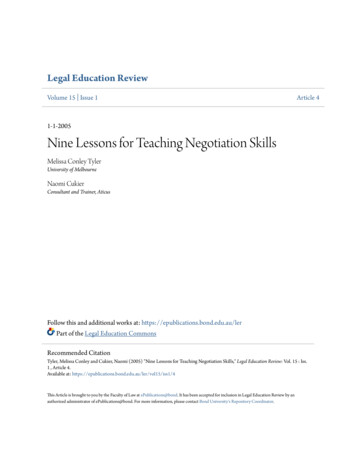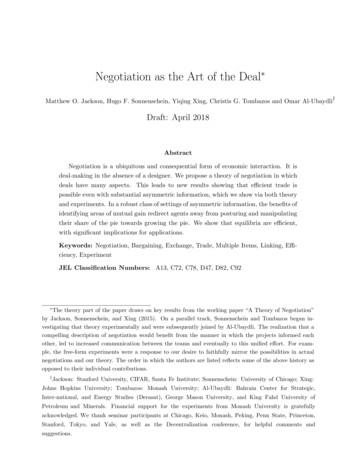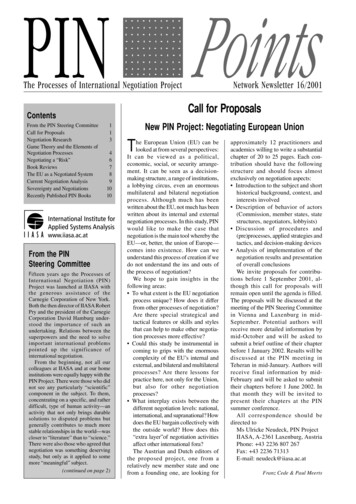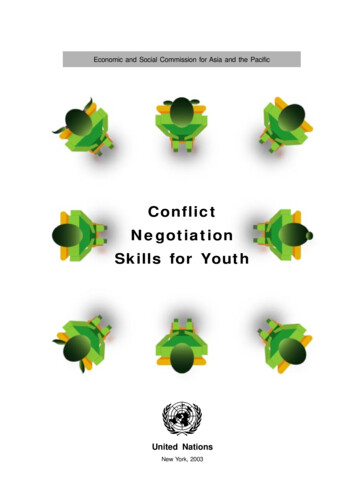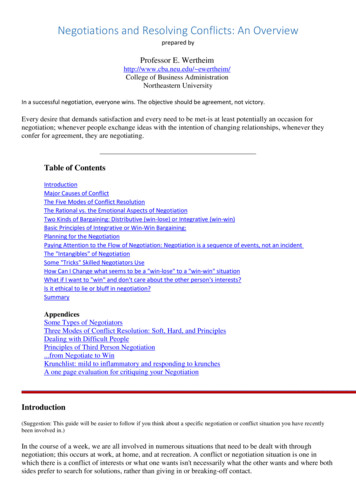
Transcription
Negotiation SkillsAtlantic Speakers Bureau and Human Skills Development980 Route 730, Scotch Ridge NB Canada E3L 5L2 or P.O. Box 55 Calais, ME USA 046191-506-465-0990 FAX: 1-506-465-0813info@humanskillsdevelopment.ca info@atlanticspeakersbureau.comAtlantic Speakers Bureau and Human Skills Development Student Training ManualTraining MaterialsAtlantic Speakers Bureau and Human Skills Development
TABLE OF CONTENTSModule One: Getting Started .5Workshop Objectives . 5Pre-Assignment Review . 6Module Two: Understanding Negotiation .7Types of Negotiations . 7The Three Phases . 8Skills for Successful Negotiating . 9Case Study. 10Module Two: Review Questions. 11Module Three: Getting Prepared . 13Establishing Your WATNA and BATNA. 13Identifying Your WAP . 14Identifying Your ZOPA . 15Personal Preparation . 15Case Study. 16Module Three: Review Questions . 17Module Four: Laying the Groundwork . 19Setting the Time and Place . 19Establishing Common Ground . 20Creating a Negotiation Framework . 21The Negotiation Process . 22Case Study. 24Module Four: Review Questions . 25Atlantic Speakers Bureau and Human Skills Development
Module Five: Phase One — Exchanging Information . 27Getting Off on the Right Foot . 27What to Share . 28What to Keep to Yourself . 28Case Study. 29Module Five: Review Questions . 30Module Six: Phase Two — Bargaining . 32What to Expect . 32Techniques to Try . 33How to Break an Impasse . 34Case Study. 35Module Six: Review Questions . 36Module Seven: About Mutual Gain . 38Three Ways to See Your Options. 38About Mutual Gain . 39Creating a Mutual Gain Solution . 40What Do I Want? . 40What Do They Want? . 41What Do We Want?. 41Case Study. 42Module Seven: Review Questions . 43Module Eight: Phase Three — Closing . 45Reaching Consensus. 45Building an Agreement . 46Setting the Terms of the Agreement . 46Case Study. 47Atlantic Speakers Bureau and Human Skills Development
Module Eight: Review Questions . 48Module Nine: Dealing with Difficult Issues . 50Being Prepared for Environmental Tactics . 50Dealing with Personal Attacks . 51Controlling Your Emotions . 52Deciding When It’s Time to Walk Away. 52Case Study. 53Module Nine: Review Questions . 54Module Ten: Negotiating Outside the Boardroom . 56Adapting the Process for Smaller Negotiations . 56Negotiating via Telephone. 57Negotiating via Email . 57Case Study. 58Module Ten Review Questions. 59Module Eleven: Negotiating on Behalf of Someone Else . 61Choosing the Negotiating Team . 61Covering All the Bases. 62Dealing with Tough Questions . 62Case Study. 63Module Eleven: Review Questions . 64Module Twelve: Wrapping Up . 66Words from the Wise . 66Atlantic Speakers Bureau and Human Skills Development
Success in business requires training anddiscipline and hard work. But if you’re notfrightened by these things, theopportunities are just as great today asthey ever were.David RockefellerModule One: Getting StartedWelcome to the Negotiation Skills workshop. Although peopleoften think of boardrooms, suits, and million dollar deals whenthey hear the word “negotiation,” the truth is that we negotiateall the time. For example, have you ever: Decided where to eat with a group of friends? Decided on chore assignments with your family? Asked your boss for a raise?These are all situations that involve negotiating! This workshop will give participants an understandingof the phases of negotiation, tools to use during a negotiation, and ways to build win-win solutions forall those involved.Workshop ObjectivesResearch has consistently demonstrated that when clear goals are associated withlearning that the learning occurs more easily and rapidly. With that in mind, let’sreview our goals for today.By the end of this workshop, participants will be able to: Understand the basic types of negotiations, the phases of negotiations, and the skills needed forsuccessful negotiating Understand and apply basic negotiating concepts: WATNA, BATNA, WAP, and ZOPA Lay the groundwork for negotiation Identify what information to share and what to keep to yourself Understand basic bargaining techniquesPage 5 Atlantic Speakers Bureau and Human Skills Development
Apply strategies for identifying mutual gain Understand how to reach consensus and set the terms of agreement Deal with personal attacks and other difficult issues Use the negotiating process to solve everyday problems Negotiate on behalf of someone elsePre-Assignment ReviewThe purpose of the Pre-Assignment is to get you thinking about the negotiationprocess.As a pre-assignment, think about what you consider the characteristics of asuccessful negotiator.Page 6 Atlantic Speakers Bureau and Human Skills Development
Information is a negotiator’s greatestweapon.Victor KiamModule Two: Understanding NegotiationBefore we get started, let’s take a look at two basic types ofnegotiation. We’ll consider the three phases of negotiation and theskills you need to become an effective negotiator.Types of NegotiationsThe two basic types of negotiations require different approaches. Integrative negotiations are based on cooperation. Both parties believethey can walk away with something they want without giving up somethingimportant. The dominant approach in integrative negotiations is problemsolving. Integrative negotiations involve: Multiple issues. This allows each party to make concessions on less important issuesin return for concessions from the other party on more important issues. Information sharing. This is an essential part of problem solving. Bridge building. The success of integrative negotiations depends on a spirit of trustand cooperation.Distributive negotiations involve a fixed pie. There is only so much to go around and each partywants as big a slice as possible. An example of a distributive negotiation is haggling over theprice of a car with a car salesman. In this type of negotiation, the parties are less interested informing a relationship or creating a positive impression. Distributive relationships involve: Keeping information confidential. For example, you don’t want a car salesman toknow how badly you need a new car or how much you are willing to pay.Page 7 Atlantic Speakers Bureau and Human Skills Development
Trying to extract information from the other party. In a negotiation, knowledge trulyis power. The more you know about the other party’s situation, the stronger yourbargaining position is. Letting the other party make the first offer. It might be just what you were planningto offer yourself!The Three PhasesThe three phases of a negotiation are:1. Exchanging Information2. Bargaining3. ClosingThese phases describe the negotiation process itself. Before the process begins, both parties need toprepare for the negotiation. This involves establishing their bargaining position by defining their BATNA,WATNA, and WAP (see Module Three). It also involves gathering information about the issues to beaddressed in the negotiation.After the negotiation, both parties should work to restore relationships that may have been frayed bythe negotiation process.It is essential to pay attention to all the phases of negotiation. Without the first phase, the exchange ofinformation, and the establishment of bargaining positions, the second phase cannot happen in anymeaningful sense because no one knows where they stand. It sets a scene for demands to bemanageable and reasonable. Negotiations are, after all, about the art of the possible. Without the thirdphase, anything that has been decided during phase two cannot be formalized and will not take hold –leading to the necessity for further negotiation or an absolute breakdown in a relationship.Page 8 Atlantic Speakers Bureau and Human Skills Development
Skills for Successful NegotiatingKey skills include:Effectivespeaking Effectivespeaking Self-confidenceEffectivelistening Effectivelistening Emotional intelligenceA sensehumor A senseof ofhumor PersistenceA positiveattitude A positiveattitude PatienceRespect Respect CreativityWithout the above factors, negotiations will be difficult if not impossible. The necessity for negotiationarises because neither party will be able to get everything they want. Knowing that there must beconcessions, each party in the negotiation is required to adopt an attitude of understanding that theymust get the best deal possible in a way which is acceptable to the other party. The importance ofeffective speaking and listening is clear; it is necessary to establish what you are looking for and whatyou are prepared to accept, while understanding what the other parties will be happy with.A sense of humor and a positive attitude are essential because they allow for a sense of give and take.Negotiations can become fraught, and having the ability to see the other side’s point of view while beingsanguine with regard to what you can achieve will be essential. Of course you will want as much as youcan get – but the other side needs to achieve what they can, too. Seriously uneven negotiations willsimply lead to further problems along the line. An atmosphere of respect is essential. If you do not makeconcessions while demanding them from your counterpart, it makes for a negotiation which will end indissatisfaction.However important a sense of understanding for your “opponent” may be, it is also necessary to havethe confidence to not settle for less than you feel is fair. Good negotiators understand the importance ofbalance. Yes, you will have to make concessions, but the point of making concessions is to secure whatyou can get – so you need to pay attention to your bottom line and ensure you are not beaten down toa minimum. Knowing what is realistic, and ensuring that you can get the best deal, relies on being readyto insist upon something that the other side may not be willing to give initially. Emotional intelligence,persistence, patience, and creativity can all play a part here.Page 9 Atlantic Speakers Bureau and Human Skills Development
Case StudyJohn was looking to buy a car, and had stopped by Paul’s car lot. John told Paul that he was looking for areliable car that he could count on not to break down. Paul told him that one of the economy modelswas a great choice, noting that they had five year warranties for free mechanical repairs. Afterdiscussing the price for a while, it was apparent that neither John nor Paul wanted to budge. John took astep back and tried to understand Paul’s position. John considered that maybe his offer was belowPaul’s minimum price. With that in mind, John discussed the minimum price for the car and ended upgetting a very fair deal.Page 10 Atlantic Speakers Bureau and Human Skills Development
Module Two: Review Questions1) How many basic types of negotiations are there?a)b)c)d)TwoFourThreeFive2) What are the two approaches to negotiation?a)b)c)d)Initial and finalIntegrative and recessiveDistributive and integrativeGeneral and broad3) Integrative negotiations are based on ness4) The approach in integrative negotiations is problem solving.a)b)c)d)FinalDominantCrucialEasiest5) Distributive negotiations involve a .a)b)c)d)Fixed pieBaked goodPeach cobblerFlat pancake6) Which of these is involved in distributive negotiations?a)b)c)d)Multiple issuesKeeping information confidentialInformation sharingBridge buildingPage 11 Atlantic Speakers Bureau and Human Skills Development
7) Which of these is not an example of integrative negotiations?a)b)c)d)Information sharingBridge buildingTrying to extract information from the other partyAllowing each party to make concessions8) How many phases of negotiation are there?a)b)c)d)ThreeNineSevenTwo9) Which of these is not one of the phases of hanging information10) Which of these is not one of the skills needed for successful negotiation?a)b)c)d)Effective speakingLikeabilitySense of humorRespectPage 12 Atlantic Speakers Bureau and Human Skills Development
If you don’t know where you are going, youwill probably end up somewhere else.Lawrence J. PeterModule Three: Getting PreparedLike any challenging task, negotiation requires preparation. Beforeyou begin a negotiation, you need to define what you hope to getout of it, what you will settle for, and what you considerunacceptable. You also need to prepare yourself personally. The keyto personal preparation is to approach the negotiation with selfconfidence and a positive attitude.Without this preparation, you will end up giving more than you getfrom negotiations. It may be unavoidable that you will have to giveup more than you would ordinarily be willing to, but finding thebalance between acceptable concessions and getting the best dealfor yourself relies on you being ready to go into negotiations with the strongest bargaining position youcan.Establishing Your WATNA and BATNAIn most negotiations, the parties are influenced by their assumptionsabout what they think are the alternatives to a negotiated agreement.Often the parties have an unrealistic idea of what these alternatives are,and they are unwilling to make concessions because they think they cando just as well without negotiating. If you do not have a clear idea ofyour WATNA (Worst Alternative to a Negotiated Agreement) andBATNA (Best Alternative to a Negotiated Agreement), you will negotiate poorly based on false notionsabout what you can expect without an agreement.Often the parties in a negotiation need to decide how likely a particular outcome will be. If your WATNAis something that would be difficult for you to accept, but the likelihood of it happening is small, youmight not feel compelled to give up much in negotiations. Realism is essential in this situation. If youcould have the ideal situation, the “blue sky” scenario, negotiations would not be necessary. In order tofocus on the negotiations with a sense of purpose, your WATNA is important. What is often referred toas the “worst case scenario” is something that any sensible person will think about before embarking onany initiative. What if it goes wrong? How will we deal with that? How you feel about the WATNA willdictate how flexible you need to be (and therefore will be) in negotiations.Page 13 Atlantic Speakers Bureau and Human Skills Development
The BATNA is almost more important than the WATNA. If you look at your situation in the absence of anegotiated agreement, and find it almost unthinkable, you will be pressed to enter negotiations in thehope of getting a satisfactory agreement. The word “satisfactory” is important here. Is the WATNAbetter than satisfactory? Is the BATNA worse? Generally, people only enter into negotiations becausethey feel they have to. They arrive at this conclusion based on analysis of their WATNA and BATNA.Identifying Your WAPIn any negotiation, it is important that you keep your WAP (Walk Away Price) toyourself, especially if it is significantly less than your initial offer. If the other partyknows that you will be willing to take a lot less than you are offering, then you willbe negotiating from a position of weakness. If the other party knows, or has anidea of your WAP then it stops being your WAP and simply becomes your price.Establishing a WAP in your mind, and ensuring that those negotiators on your sideof the bargain (and only they) know it, allows you to take your strongest possible bargaining position.The other party will try to argue you down from your proposed price, so you will need to remain firm. Ifthey want to pay less, then you may be prepared to agree on a lower price in return for concessions.The opposing party will then have to consider what is acceptable to them. Rather than push too hardand lose out on a deal which would be beneficial to themselves, they will have their own areas wherethey are willing to make concessions. However, if they know that you have set a WAP that would savethem money, they will simply hold firm at that price. They have no incentive to make concessions toyou. In many ways, negotiation is about keeping as much to yourself as you possibly can until you can nolonger maintain that position.Once you have set your WAP, it is essential to keep to it. A walk away price becomes absolutelymeaningless if you are not prepared to walk away should it not be met. You should give the impressionto opponents in negotiation that you could walk away at any time. They will, after all, not be preparedto stop once they get a price which is satisfactory to them – they will look to wring a bit more value outof the deal for themselves, testing you to see what you will give up. A warning against setting your WAPunrealistically low is that the other party will not take you seriously if you are a pushover in negotiations.They will seek to test you at every turn.Page 14 Atlantic Speakers Bureau and Human Skills Development
Identifying Your ZOPAIn the negotiation for the used car, both parties should feel good about theoutcome. Even though the parties might have hoped for a better deal, both got abetter price than their WAP.This negotiation demonstrates the importance of keeping your WAP to yourself ifyou want to negotiate the best deal. Your range in this situation falls between theprice that you would ideally, realistically get and the WAP you have set. In an idealworld you could demand a million dollars and expect to get it. In a realistic world, you need to berealistic in negotiations.You should arrive at your ideal realistic price by seeing what the accepted market value for what you areoffering is. By adjusting for your specific negotiating position (whether you are approaching it from aposition of need, etc.), you can find your best realistic price. Then think about a price at which it wouldno longer be worthwhile to strike a deal.Your co-negotiator will have done the same. What he hopes to pay and what you hope to get are justthat – hopeful. The ZOPA (Zone Of Possible Agreement) is the area in which the final price will sit, andwithin that ZOPA you will ideally end up with a price closer to their WAP than yours. If you hint at whereyour WAP is, the other party will be less likely to come to an agreement that is substantially better thanthat.Personal PreparationOne way to relieve some of the tension you may be feeling before a negotiation isto remind yourself that there is nothing to be afraid of. As long as you understandyour position, there is no danger that you will “lose” the negotiation. During andbefore negotiation you should always be: Polite - It never reduces your argument Firm - Removes Perceptions of Weakness Calm - Facilitates Persuasion and Compromise Do not take things personallyKnowing your position before entering negotiations means that you are sure of your “red lines”. Thingsthat you are not prepared to consider that would make your position worse than it is now. Many peopleget pushed into a deal which is unsatisfactory to them because they have failed to prepare for thenegotiation in this way. If you go into negotiations with vague ideas, that vagueness will become aweakness in your negotiating position.Page 15 Atlantic Speakers Bureau and Human Skills Development
The important thing about your position in negotiations is that you should be the only one who knowswhat it is. Many people compare negotiation to a game of poker. When playing poker you should alwaysbe careful to keep to yourself what kind of hand you have. If your opponent knows your position, theywill squeeze you to its very limits, confident that you have no strong impetus to push back.When a negotiator knows that their “opponent” has a weak or compromised position, they willinstinctively know that they are negotiating with someone who is working from a position ofdesperation. They will believe “that’s what he’s decided he is willing to settle for, because he needs thisdeal. Does he need it enough to give me a little bit more leverage?”, and will negotiate from thatstandpoint.Case StudyTed was a B2B sales representative for a paper company. He was meeting with a representative fromanother office to discuss a potential business deal between their two firms. Before the meeting, Tedtook the time to prepare himself for everything that may come up. He considered his WATNA andBATNA scenarios. At worst, the other company could choose to do business with another supplier. Atbest, they’d be a long-term customer. He also set his Walk Away Price based on the profit level for thecompany. When he got to the meeting, he was much more prepared than his counter-part and endedup negotiating a long-term contract with them.Page 16 Atlantic Speakers Bureau and Human Skills Development
Module Three: Review Questions1) Negotiation requires .a)b)c)d)WhiningPreparationCash reservesGumption2) What are two things you must have in order to approach negotiation successfully?a)b)c)d)Law and orderCoffee and treatsSelf-confidence and positive attitudeFear and loathing3) Getting the best deal for yourself relies on you being ready to go into negotiations with thestrongest position you ing4) In most negotiations, the parties are by their assumptions about what they thinkare the alternatives to a negotiated corporated5) What does the acronym WATNA stand for?a)b)c)d)With a treaty nothing advancesWithout a talk nobody agreesWorst alternative to a negotiated agreementWrong alternative to a negotiated agreement6) What does the acronym BATNA stand for?a)b)c)d)Better alternative to a negotiated agreementBest alternative to a negotiated agreementBargaining alternative to a negotiated agreementBlissful alternative
Skills for Successful Negotiating Key skills include: Effective speaking Effective listening A sense of humor A positive attitude Respect Without the above factors, negotiations will be difficult if not impossible. The necessity for negotiation arises because ne



